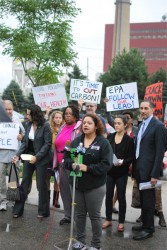 Following the one-year anniversary of the closure of Chicago’s Fisk and Crawford coal-fired power plants, community organizations and members of the Chicago Clean Power Coalition gathered last Thursday to support the U.S. Environmental Protection Agency’s (EPA) strong new standards on carbon pollution from new power plants. The groups urged EPA to follow in the footsteps of local community groups that led a decade-long campaign fighting climate disruption, and to issue the strongest possible standards on carbon pollution.
Following the one-year anniversary of the closure of Chicago’s Fisk and Crawford coal-fired power plants, community organizations and members of the Chicago Clean Power Coalition gathered last Thursday to support the U.S. Environmental Protection Agency’s (EPA) strong new standards on carbon pollution from new power plants. The groups urged EPA to follow in the footsteps of local community groups that led a decade-long campaign fighting climate disruption, and to issue the strongest possible standards on carbon pollution.
“It is vital that the EPA finalizes the strongest possible carbon standards so more communities can address air pollution and take part in addressing the challenging impacts of climate disruption on our communities,” said Kim Wasserman, former executive director of Little Village Environmental Justice Organization and Goldman Environmental Prize 2013 Recipient.
In September, the Environmental Protection Agency announced new proposed standards under the Clean Air Act to protect Americans from dangerous carbon pollution produced by new power plants. These air quality protections will allow EPA to focus on the industries that create the lion’s share of the nation’s carbon pollution and will also help prevent life-threatening air pollution like toxic mercury, dirty soot and the smog that triggers asthma attacks.
“For more than a decade, our organizations and the Chicago Clean Power Coalition worked to bring attention to pollution impacts of these plants and it’s time for other coal plants around Illinois and the country to start addressing their carbon footprint,” said Sylvia Garcia Sadowski with the Pilsen Environmental Rights and Reform Organization.
Twelve of the warmest years in recorded history occurred in the last fifteen years due to climate disruption. According to a recent report released by the Intergovernmental Panel on Climate Change (IPCC) authored by 259 scientists and contributors from 36 countries, global temperatures will continue to rise unless greenhouse gas emissions like carbon pollution are curbed.








